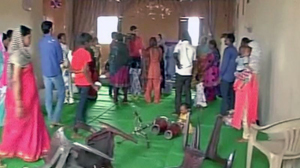Raipur, March 6: A group of youths today barged into a church at Kachna village on the city outskirts and allegedly vandalised the premises and thrashed the people present, police said.
"Around 15-20 youths entered the church premises located at Kachna village while prayer was underway," Raipur Additional Superintendent of Police Neeraj Chandrakar told PTI.
They damaged chairs, fans and other articles in the premises and even beat up the people present, Chandrakar said.
The accused were reportedly sporting saffron bands on their forehead, the ASP said. They fled the spot when the police arrived, he said.
Based on the victims' complaint, a case has been registered under sections 452 (house-trespass after preparation for hurt), 295 (injuring or defiling place of worship with intent to insult the religion of any class) and 147 (rioting) of the IPC, he said.
Three motorcycles belonging to the accused were seized from the spot, he said, adding efforts are on to nab the miscreants.
Meanwhile, president of Chhattisgarh's Christian Forum, Arjun Pannalal claimed that it was the fourth attack on a Christian place of worship in the past one month in the state.
"Around 15-20 men with saffron bands on their forehead entered the church while Sunday prayer was under way at around 12 PM, and started vandalising the premises," Pannalal said.
"They started damaging chairs and fans. They did not spare women and even tore up their clothes. They also thrashed an infant," he said.
The assailants were heard accusing that people were being converted in the church, he said.
"A group of 40-50 people from downtrodden families in the village had set up the church under a tin shed, where they perform prayers every Sunday," he said, refuting the conversion charge.
He said, "We are thankful to the police that they reached immediately and took the necessary action."







Comments
These People should get Severe punishment. They don't have Respect to God. If These people don't have respect towards Women then what respect they will show to their Mother ? Do something Good & show.. People will Praise You.. Try to Be Humans Not Animals..
BAJARANG DAL IS ONLY FIT FOR THESE TYPE OF WORK...
WHERE IS ANUPAM KHER........
Add new comment